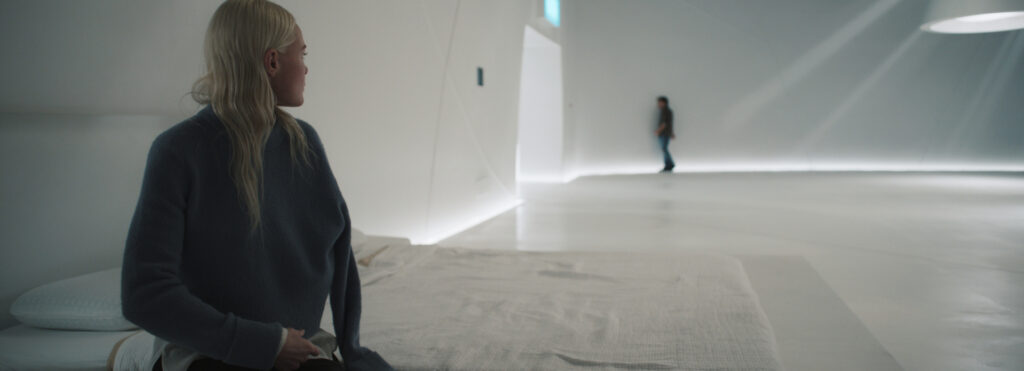The Immaculate Room, despite occasional bursts of creativity and excitement, ultimately falls into the trap of predictability both in its storyline and its underlying message. The concept of this film is straightforward – two individuals, Mike (Emile Hirsch) and Kate (Kate Bosworth), agree to spend fifty days in an isolated room in exchange for a staggering five million dollars in cash.
Cut off from the outside world and stripped of any form of entertainment, they are left alone with only the enigmatic voice of the room as their company. As enticing as this proposition may seem, the film demonstrates that even the strongest wills can be shattered and corrupted under the immense weight of complete isolation.

A Rehashed Premise
From the initial description, it becomes evident that The Immaculate Room follows a well-worn path, lacking innovation. This confined examination of the human condition, delving into the limits individuals can endure before reaching their breaking point, has been explored countless times before in films like Saw and Escape Room.
However, unlike these movies that introduce fresh perspectives to the genre, The Immaculate Room simply assumes that the audience will wholeheartedly embrace the premise. It hurriedly presents the exposition in the first ten minutes, leaving little room for intrigue, and slowly builds towards the film’s final moments.
While The Immaculate Room may not be the worst film ever made, it is challenging to empathize with its characters or become invested in their experiences. Mike and Kate are far from likeable, spending the majority of their time either bickering or bemoaning their circumstances. Their defeatist attitude gives the impression that they have already lost the game before it even begins, diminishing any potential tension or anticipation. Although the film attempts character development through lengthy monologues about their pasts, these revelations come too late, long after the audience has already formed their opinions of the protagonists.

Moments of Excellence
Nevertheless, amidst its shortcomings, The Immaculate Room does exhibit a few notable strengths. The final act represents a marked improvement compared to the rest of the film, raising the stakes and delving deeper into the psychological attributes of the characters in a manner that feels genuine and captivating.
If one can endure the overwhelming predictability of the storyline, this section offers some redemption for the underwhelming first hour. Emile Hirsch and Kate Bosworth deliver commendable performances, skillfully portraying their characters’ mental unraveling. However, the flat characterization that permeates the remaining narrative hinders their abilities.
The Immaculate Room: A Missed Opportunity
Above all, The Immaculate Room serves as a reminder that an intriguing concept alone cannot guarantee a compelling film. Hidden beneath layers of predictability and a monotone narrative lies the potential for interesting ideas. Regrettably, the movie fails to uncover and fully explore these possibilities.
The lackluster characters and the film’s hesitancy to take any risks ultimately leave The Immaculate Room feeling unremarkable and unnecessary. While the concept of the ‘Immaculate Room’ holds promise, this particular film does not do justice to the idea.
Frequently Asked Questions
1. Is The Immaculate Room worth watching despite its shortcomings?
While The Immaculate Room may not meet everyone’s expectations, some viewers may find enjoyment in the film’s exploration of isolation and its final act that offers redeeming qualities. However, it is important to note that the overall predictability and flat characterization may hinder one’s enjoyment.
2. Does The Immaculate Room bring anything new to the genre of confined examinations?
Unfortunately, The Immaculate Room does not bring any fresh perspectives or innovative ideas to the genre of confined examinations of the human condition. It largely relies on familiar tropes and fails to differentiate itself from similar films that have explored similar themes.
3. Are Emile Hirsch and Kate Bosworth’s performances noteworthy?
Amidst the film’s shortcomings, both Emile Hirsch and Kate Bosworth deliver commendable performances, particularly in the final act where their characters undergo psychological turmoil. Their abilities shine through, even though the characters themselves are thinly developed.
4. Does The Immaculate Room successfully create tension?
Unfortunately, due to the characters’ defeatist attitudes and the film’s lack of investment in their development, The Immaculate Room fails to effectively build tension. Without a sense of investment in the characters’ outcomes, the potential for suspense and apprehension is diminished.
5. Is there potential for a captivating story within the concept of the ‘Immaculate Room’?
Indeed, the concept of the ‘Immaculate Room’ holds promise for an intriguing and thought-provoking narrative. However, the execution in this particular film falls short of fully capitalizing on that potential. With stronger character development and a willingness to explore new ground, a more compelling story could emerge within this premise.













